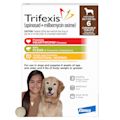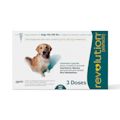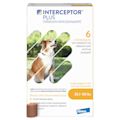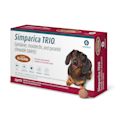Heartworm Medicine for Dogs
Heartworm Medicine and Prevention for Dogs
Heartworm disease in dogs is fatal if left untreated. Pets get the illness when a mosquito bites them and infects them with larvae. Since these insects are everywhere, veterinarian's recommend having a year-round prevention plan. By doing this you can protect your dog from heart failure, lung disease, and organ damage. Learn how the parasite life cycle works and the heartworm medicine for dogs that is available.
FAQs about Prescription Heartworm Medicine
The best selling dog prescription heartworm brands are:
Finding the best heartworm preventative medication for your dog is a decision that is best made in partnership with your veterinarian. The right heartworm preventive medication for your dog depends on a lot of factors you can discuss with your veterinarian. The great news is there are a lot of options, which include injectable long-lasting preventative, chewable, topical application – and combinations that also prevent against internal parasites like roundworms and external parasites like fleas and ticks. Depending on the lifestyle and needs of you and your pet, you can select from many options. Breed is also taken into consideration when choosing the best heartworm therapy for your pet. Some breeds such as collies, may have an increased sensitivity to the active ingredient Ivermectin.
Yes, you need a prescription for heartworm preventative in the United States. Most Veterinarians require a recent negative heartworm test be on file before prescribing heartworm preventatives. Heartworm testing is performed annually to ensure your pet continues to be free from heartworms and it’s safe to continue to administer the heartworm medication prescribed by your veterinarian.
Yes, it's recommended that you keep your pet on year-round heartworm prevention treatment, because carriers of the disease never truly go away. Many heartworm preventative medications include preventatives for other worms your dog may contract. Indoor dogs also benefit from year-round protection, due to the variety of worms and diseases that your dog may encounter throughout the year.
It depends on the preventative you and your veterinarian have selected is best for your pet. Most oral or topical preventatives are given monthly and should be used year-round. The current injectable heartworm preventatives are administered by a veterinarian either every 6 or 12 months. Proper dosing and administration should be discussed with your veterinarian.
Heartworm Medicine for Dogs
Dog Dewormers & Worm Medicine
Prescription Flea & Tick Medicine for Dogs
Prescription Dewormer for Dogs
Roundworm Treatment For Dogs
Heartworm Prevention for Cats
Flea Tick And Heartworm Pill
Heartworm Flea And Tick Prevention For Puppies
Dewormer Chewables for Pets
Prescription Flea & Tick Medicine
Parasite Protection For Dogs
Flea & Tick Solutions for Dogs
Dog Medicine and Prescriptions
Topical Flea & Tick Treatment for Dogs
Prescription Dewormer for Cats
Prescription Allergy Medicine for Dogs
Equine Dewormers
Flea & Tick Shampoos for Dogs
Dewormer Treatments
Tapeworm Chews For Dogs
Advantage Heartworm Medicine for Dogs
Sentinel Heartworm Medicine for Dogs
Trifexis Heartworm Medicine for Dogs
Revolution Heartworm Medicine for Dogs
Sentinel Spectrum Heartworm Medicine for Dogs
Iverhart Max Heartworm Medicine for Dogs
Interceptor Heartworm Medicine for Dogs
Credelio Quattro Heartworm Medicine for Dogs
NexGard Plus Heartworm Medicine for Dogs
Interceptor Plus Heartworm Medicine for Dogs
Simparica Trio Heartworm Medicine for Dogs
Elanco Dog Dewormers & Worm Medicine
Interceptor Plus for Dogs: Heartworm Prevention & Medication
Iverhart Max Dog Medicine and Prescriptions
Iverhart Max Prescription Flea & Tick Medicine
Revolution for Dogs: Prescription Heartworm & Flea Control
Sentinel for Dogs: Prescription Heartworm & Flea Tablets
Iverhart Max Flea & Tick Solutions for Dogs
Sentinel Spectrum Prescription Dewormer for Dogs
Sentinel Prescription Dewormer for Dogs
Where can I get a heart worm test for my dog
What drugs can I give my dog that has Parasitic Worms of the Skin
What is the best Heart Worming medicine that i can give my Blue Heeler and Australian Cattle Mix? One Vet gave my dog Heart Guard but it cause her heart to stop? Is there another type of Heart Wormier to give her with out having the same problem again?
Which is better ORC Heartworm medication,or a Heartworm medication given by a vet?
What is the best worm medicine for 7 weeks old Jack Russell And chiuaa? They are small puppies
What over the counter monthly heartworm/parasite medication would you recommend? I can't afford to buy it from my vet at the moment.
My dog tested positive for heartworm antigens, but our vet thinks a slow kill treatment plan should work well. My question is about the efficacy of the different treatment options. Which of the 3 following would be most recommended in combination with doxycycline (for 30 days followed by 90 days without doxycycline, then repeat until negative for heartworms)? 1) Moxidectin Injection (ProHeart 6) 2) Ivermectin (Heartgard) 3) Moxidectin Topical (Advantage Multi)
When should I start heartworm prevention? And I can’t afford constant doctor visits, how can I get the medicine?
I my dog tested positive for adult heartworms will ivermectin treat her?
Best flea/ parasite pill for small dog?
We just got a 9 week old, 3.5 lb. Puppy. When should he start heartworm medicine, which one is the safest, and does he need tested first?
What is the prescribed dose of deworming drug to be given to my puppy? And which deworming drug to use (available in India)?






